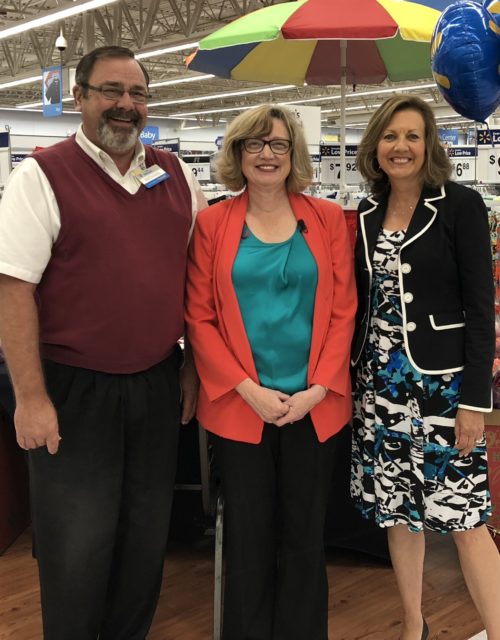Dear Friends and Neighbors,
Let me start by thanking the dozens of people who attended our town-hall meeting earlier this spring. We covered a broad range of issues, and the questions and comments from constituents were very informative. Considering the level of partisanship I’d seen at the Capitol during this year’s legislative session, I also appreciated how the discussions at the 17th District town hall were respectful of the differing opinions in the auditorium.

I’m thrilled when local companies do well, so I was delighted to be present when Vancouver’s Healers Pet Care received an invitation to meet with some of Walmart’s top leaders – an opportunity that could lead to nationwide exposure for the company’s products!
Although the 2018 regular session has been over for more than two months, my legislative calendar still has plenty of entries. The good news is that they tend to be here in the 17th District and Clark County, and involve people I represent. Some are inspiring, like the recent Friends of Scouting leadership breakfast, and others are about relationships, like my chance to sit down with people from childcare centers and the new state Department of Children, Youth and Families to talk about childcare issues. I look forward to more opportunities like these in the coming months.
Earlier this month I took part in the annual Legislative Review luncheon co-hosted by the Building Industry Group and Greater Vancouver Chamber of Commerce. It was a different audience compared to our town-hall meeting, of course, but the questions were interesting and the discussion was good.
Legislative committees often meet during the “interim” between our annual sessions to keep up on issues. This past week I was up at the Capitol for a meeting of our Senate Labor and Commerce Committee; also, our Senate Law and Justice Committee had met in Seattle back on May 4. Of the 12 policy committees in the Senate, the Law and Justice panel is one of the most active (and most traveled) during the interim. We’ll be having a work session again next month, this time in Vancouver at the city council chambers (10 a.m., June 13)! The agenda is still taking shape, and it’s posted at this link; the meeting is open to the public, just as it would be in Olympia, and I hope you will consider attending, especially if any of the topics are of interest.
Way to go, MESA Day competitors!
I had the privilege of being at WSU Vancouver recently for the annual MESA Day regional competition. MESA stands for “Mathematics, Engineering, Science, Achievement.”
This year’s competition involved designing and building a prototype of an electronic device that could meet a person’s needs. These students were vying for a chance to represent our part of the state (the SW Region) at the state competition in Redmond, which took place this past Saturday on the Microsoft campus.

One of the 42 teams at last month’s regional MESA day entered a child car-seat device that would connect to a light or sound and let drivers know if their infant or toddler becomes unbuckled.
It was inspiring to spend several hours at the regional competition (also a Saturday), meeting the teams and learning about their projects. What a great program!
A firsthand look at a major threat to salmon runs
Efforts to protect our native fish populations are always up there on the list of public policy issues. And they should be, although salmon sometimes end up being a sort of “political football” – an excuse for short-sighted proposals like removing federal dams.
I’d like to see more attention go toward protecting salmon and steelhead from overpredation. Abnormally large populations of sea lions and terns (similar to gulls) mean an abnormally large number of migrating salmon never make it to their spawning streams.
Because marine mammals are under federal jurisdiction, permission for state and tribal managers to reduce the sea lion population has to come from Congress. U.S. Rep. Jaime Herrera Beutler has introduced bipartisan legislation to that effect, which I support. To see the situation myself, I went to Bonneville Dam recently with several other Washington legislators (and legislative staff). The visit, led by our state’s fish and wildlife department, included people from federal agencies, tribal interests, Oregon’s fish and wildlife department, and the Columbia River Salmon and Steelhead Advisory Board.
What our group witnessed wasn’t a surprise to me (except maybe the attacks on sturgeon in addition to salmon). But if you take the predation we saw within the space of a few hours and multiply it by days and weeks and months, you get a sense of the staggering number of fish lost to marine mammals alone, on just one stretch of the Columbia. It was good for such a varied group to all see the same things, because it gives us a common point of reference.
Judge upholds constitutional process in I-940 case
Right after this year’s session wrapped up, I mentioned in a news release how our 60 days in Olympia included “blatant sidestepping of the state constitution on high-profile budget and public-safety legislation.” The public-safety reference had to do with a vote taken on the 60th and final day, about Initiative 940 – a citizen initiative to the Legislature, concerning the use of deadly force by law-enforcement officers.
Under Washington’s constitution, the Legislature had three choices. One was to enact the policy in I-940, meaning it would become law without going to the ballot. The second was to let the measure go forward to the November ballot. The third was to let the measure proceed to the November ballot but to also offer an alternative policy for voters to consider.
Although my side of the aisle tried repeatedly to talk them out of it, leaders on the majority side of the Senate decided to invent a fourth choice – to sidestep the constitution – and vote on legislation intended to change the language in I-940. In other words, they attempted to alter a law that didn’t yet exist, effectively cutting out the more than 350,000 people who signed petitions to qualify I-940 for the ballot. Their move was challenged in court, and a Thurston County judge declared it unconstitutional.
The judge also ordered that I-940 be placed on the November ballot, in its original form. Whether the Legislature can still offer an alternative remains to be seen (we would have to meet in special session to accomplish that, if it’s legally possible). Either way, the constitutional process has prevailed.
I hope you have a safe holiday weekend, whether you stay close to home or travel – and while you’re enjoying good food or being out in the nice (hopefully) weather, take a moment on this Memorial Day to commemorate all the military men and women who gave their lives in service to their country.
I’m out and about in our district all the time, so if you see me please say hello!
Yours in service,











